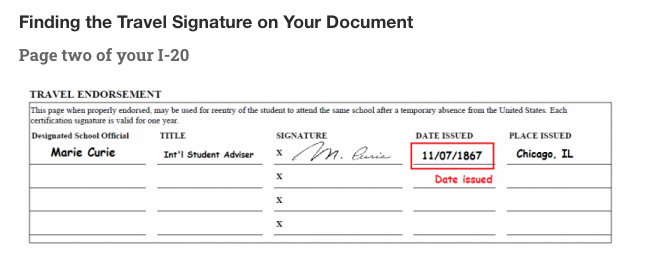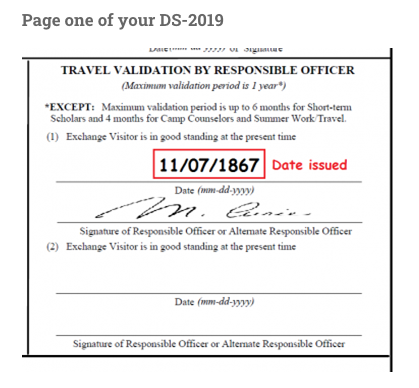Travel
If you are a continuing student in valid F-1 or J-1 status taking a short trip or summer break abroad and will return to the U.S. to continue your academic program or authorized employment, plan ahead and get all documents in order.
Before leaving the U.S., prepare the following documents. On your return flight to the U.S., make sure these documents are in your carry-on luggage.
- Valid passport (must be valid at least 6 months into the future from your return date)
- Valid U.S. visa in the passport (except citizens of Canada and Bermuda)
- Valid form I-20 (F-1) / DS-2019 (J-1) with ISSA travel signature. Request a travel signature in iStart, under Other Requests, well in advance of travel.
Students on OPT or STEM OPT: In addition to the above documents, you will need:
- Employment letter
- EAD card
Note: Re-entry is not permitted during the grace period at the end of F-1 or J-1 status.
Recommended (Not Required) Documents for Current Students
- Transcripts
- Enrollment verification or proof of registration for the next semester
- Current proof of financial support
Additional information on returning to the U.S. is available at Department of Homeland Security FAQ (Frequently Asked Questions) under F Non-Immigrants: Entry and Exit
See also Information for Spouse & Children
Valid U.S. Visa
The F-1 or J-1 student visa in your passport is a travel document that permits you to request entry to the U.S. in that specific status. It must be valid at the time that you request entry in F-1 or J-1 status.
Remaining in the U.S. with an Expired Visa
- Once you have arrived in the U.S., the visa in your passport does not need to remain valid.
- You may remain in the U.S. with an expired visa as long as your I-20/DS-2019 (EAD if on post-degree OPT) remains active and you have not violated the terms of your status. The visa is a travel document only, needed for entering the U.S.
- If your visa expires while you are inside of the U.S., you must renew it when you leave the country to be allowed to re-enter.
Valid Form I-20 or DS-2019
As an F-1 or J-1 student in good standing, you may re-enter the U.S. following brief travel or semester breaks abroad with a valid travel signature on your I-20 or DS-2019.


Finding the Travel Signature on Your Document
Page two of your I-20
Page one of your DS-2019
How Long is My Travel Signature Valid?
- Current F-1/J-1 students: Travel signature is valid for 12 months or until the end of the program of study, whichever is sooner.
- F-1 students on Post-Completion OPT/STEM OPT or J-1 students on Academic Training: Travel signature is valid for 6 months.
Note: Only ISSA advisers who are a Designated School Official (DSO) or Alternate Responsible Officer (ARO) can sign a Penn State I-20/DS-2019. Do not ask professors, coaches, or other staff to sign your immigration document.
Requesting a Travel Signature
Complete the Travel Signature form in iStart before you submit your travel signature request in iStart to avoid delays.
Citizens of Canada or Bermuda
Requirements for citizens of Canada or Bermuda re-entering the U.S. in F-1 or J-1 status:
- A valid passport and I-20/DS-2019 with a valid travel signature.
- No visa in the passport for entry or re-entry needed.
Note: Please request an I-94 at the border when admitted or re-admitted to the U.S. in F-1/J-1 status.
Automatic Visa Revalidation for Reentry to the U.S.
Under limited circumstances, it may be possible for F-1 or J-1 students to re-enter the U.S. with an expired U.S. visa after a visit of no more than 30 days to Canada, Mexico, or the adjacent islands (except Cuba). For more information on this topic, please visit the Department of State's website.
Applying for a U.S. Visa in Canada or Mexico as a Third-Country National
If you apply for a U.S. visa in Canada, Mexico, or another country that is not your home country, please check in with the U.S. consulate in that country first to ensure that your visa request can be processed there.
If you choose to apply for a U.S. visa in Canada or Mexico to regain your immigration status:
- Wait until the visa is issued (automatic visa revalidation is not applicable in this situation).
- If the visa is denied, be prepared to return to your home country directly from Canada or Mexico.
Visa for Travel To or Through Another Country
- You may need a visa to enter or transit through another country depending on your country of citizenship and legal permanent residence. Check the embassy of the country you will travel through for more details.
- You may need a visa to enter Canada, Mexico, or adjacent islands even if you may be able to use “automatic revalidation” to re-enter the U.S. from these countries. For more information about automatic revalidation, please visit the Department of State's website.
- It is your responsibility to learn about the visa requirements to enter another country. ISSA can only advise on the requirements for entry/re-entry to the U.S.
Inviting Family or Friends to Visit
If you would like to invite family and friends to visit the U.S., you should provide them with the following documents for the visa interview:
- A letter of invitation from you (in your language and English) including:
- The relationship to you
- Purpose of the visit
- Dates of the visit
- Where the visitor(s) will sleep and eat
- Any other important information
- Evidence that you can support them during the visit if you are providing room and board (that might include a bank statement or assistantship information, apartment lease, etc.)
- Evidence that you are a full-time student by requesting the enrollment verification through LionPATH.
- Copy of your I-20 or DS-2019
Visitors need to provide evidence that they intend to return abroad and not remain in the U.S.
Note: ISSA does not provide letters of invitation for family or friends to visit. The U.S. Department of State has advised that letters from ISSA are not helpful for this purpose.
Resources
- U.S. Dept. of Homeland Security Travel Information
- Automatic Visa Revalidation on the U.S. Department of State’s website


